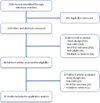Complementary and Alternative Medicine for Posttraumatic Stress Disorder Symptoms: A Systematic Review
- PMID: 24676593
- PMCID: PMC4177524
- DOI: 10.1177/2156587214525403
Complementary and Alternative Medicine for Posttraumatic Stress Disorder Symptoms: A Systematic Review
Abstract
Objectives.: To (1) characterize complementary and alternative medicine studies for posttraumatic stress disorder symptoms, (2) evaluate the quality of these studies, and (3) systematically grade the scientific evidence for individual CAM modalities for posttraumatic stress disorder.
Design.: Systematic review. Eight data sources were searched. Selection criteria included any study design assessing posttraumatic stress disorder outcomes and any complementary and alternative medicine intervention. The body of evidence for each modality was assessed with the Natural Standard evidence-based, validated grading rationale.
Results and conclusions.: Thirty-three studies (n = 1329) were reviewed. Scientific evidence of benefit for posttraumatic stress disorder was strong for repetitive transcranial magnetic stimulation and good for acupuncture, hypnotherapy, meditation, and visualization. Evidence was unclear or conflicting for biofeedback, relaxation, Emotional Freedom and Thought Field therapies, yoga, and natural products. Considerations for clinical applications and future research recommendations are discussed.
Keywords: complementary and alternative medicine; posttraumatic stress disorder.
Conflict of interest statement
References
-
- Marciniak MD, Lage MJ, Dunayevich E, et al. The cost of treating anxiety: the medical and demographic correlates that impact total medical costs. Depress Anxiety 16075454. 2005;21(4):178–184. - PubMed
-
- Kiecolt-Glaser JK, McGuire L, Robles TF, Glaser R. Psychoneuroimmunology and psychosomatic medicine: back to the future. Psychosom Med 11818582. 2002 Jan-Feb;64(1):15–28. - PubMed
-
- Solomon SD, Davidson JR. Trauma: prevalence, impairment, service use, cost. J Clin Psychiatry 9329445. 1997;58(Suppl 9):5–11. - PubMed
-
- Brunello N, Davidson JR, Deahl M, et al. Posttraumatic stress disorder: diagnosis and epidemiology, comorbidity and social consequences, biology and treatment. Neuropsychobiology 11287794. 2001;43(3):150–162. - PubMed
Included Studies
-
- Abramowitz EG, Barak Y, Ben-Avi I, Knobler HY. Hypnotherapy in the treatment of chronic combat-related PTSD patients suffering from insomnia: a randomized, zolpidem-controlled clinical trial. International Journal of Clinical & Experimental Hypnosis. 2008;56(3):270–280. - PubMed
-
- Abramowitz EG, Lichtenberg P. A new hypnotic technique for treating combat-related posttraumatic stress disorder: a prospective open study. International Journal of Clinical & Experimental Hypnosis. 2010;58(3):316–328. - PubMed
-
- Boggio PS, Rocha M, Oliveira MO, Fecteau S, Cohen RB, Campanha C, Fregni F. Noninvasive brain stimulation with high-frequency and low-intensity repetitive transcranial magnetic stimulation treatment for posttraumatic stress disorder. The Journal of Clinical Psychiatry. 2010;71(8):992–999. - PMC - PubMed
-
- Bormann JE, Smith TL, Becker S, Gershwin M, Pada L, Grudzinski AH, Nurmi EA. Efficacy of frequent mantram repetition on stress, quality of life, and spiritual well-being in veterans: a pilot study. Journal of Holistic Nursing. 2005;23(4):395–414. - PubMed
Grants and funding
LinkOut - more resources
Full Text Sources
Other Literature Sources


